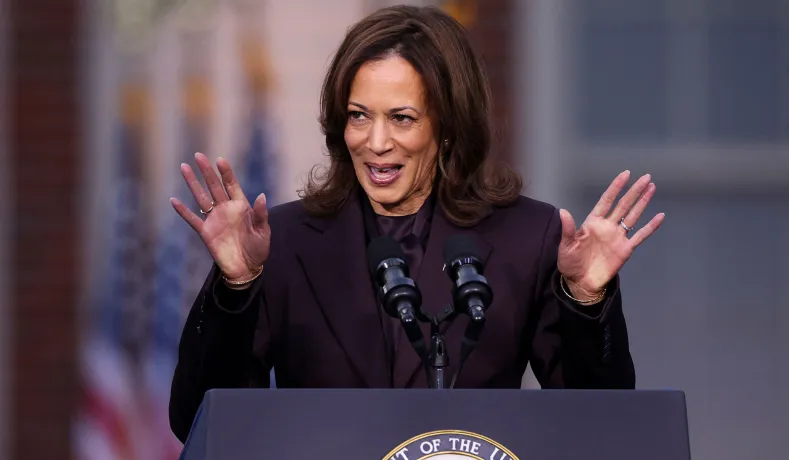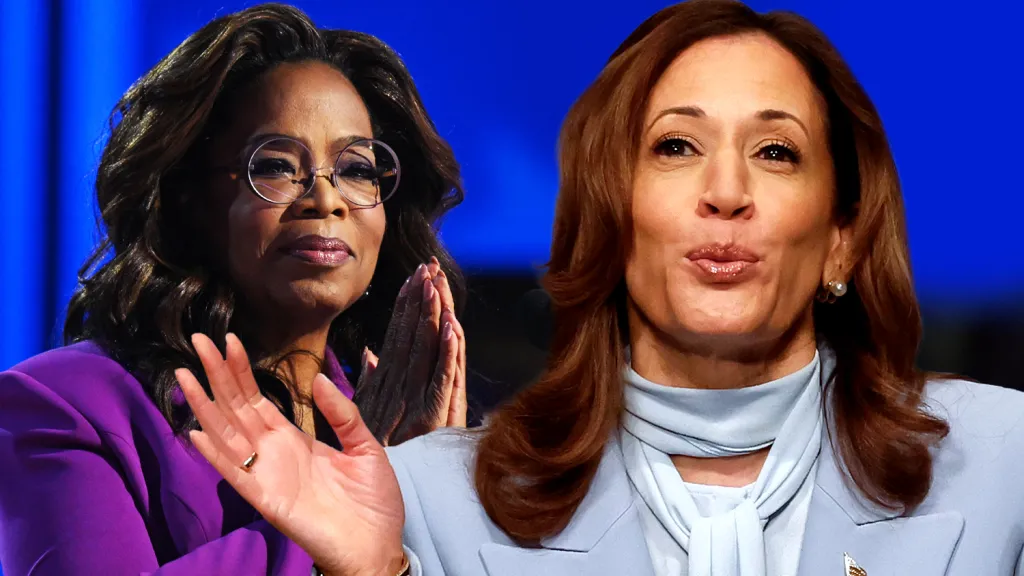In the world of high-profile politics and celebrity media, few pairings have sparked as much curiosity as the friendship between Vice President Kamala Harris and media mogul Oprah Winfrey. Over the past few years, Harris has made several appearances on Oprah’s show, with each interview generating significant attention and fueling speculation. Recently, rumors have circulated claiming that Harris may have paid Oprah for these interviews or, at the very least, influenced their content.
So, did Kamala Harris actually pay Oprah? And if so, why? This question has been the subject of intense scrutiny in both political circles and the entertainment industry. In this article, we aim to unpack the rumors, analyze the potential motivations, and consider whether there is any truth to these claims.
The Rise of Kamala Harris in the Spotlight

Kamala Harris’s political career has been one marked by significant milestones. From becoming the first female Vice President to the first woman of color to hold the office, her rise has been historic. Throughout her career, she has navigated complex political landscapes, handled intense scrutiny, and garnered both praise and criticism for her policies and positions.
In her ascent, Harris has often turned to media outlets to connect with the public. Oprah Winfrey, as one of the most influential media figures in the world, has provided a significant platform for Harris to share her thoughts, personal experiences, and political vision.
Oprah, who is known for her long-standing career in television, has built a reputation as someone who can elicit powerful, intimate responses from her guests. This ability has made her show, The Oprah Winfrey Show, one of the most iconic platforms for politicians, celebrities, and leaders to communicate their message.
The Relationship Between Kamala Harris and Oprah Winfrey
Kamala Harris and Oprah Winfrey have shared a relationship for several years, with Oprah supporting Harris’s campaigns and promoting her public persona. In 2020, Oprah publicly endorsed Harris during her presidential campaign, a powerful endorsement that many saw as a significant boost to Harris’s credibility among African American voters.
This partnership continued after Harris was named Vice President. Oprah interviewed her several times, both before and after the election. These appearances often showcased Harris in a personal light, sharing insights into her upbringing, her family, and her vision for the future of the country. Oprah’s interviews are always highly anticipated, as they tend to reveal more about the person being interviewed than the typical political soundbites we often hear in traditional media.
However, as these interviews continued to unfold, some began to question the nature of the relationship between Harris and Oprah. While many saw it as a genuine bond between two powerful women, others started speculating about the financial aspect of their interactions. Could Harris have been paying Oprah for the visibility and positive portrayal she received during these appearances?
The Rumors: Did Kamala Harris Pay Oprah?

The idea that Kamala Harris could have paid Oprah for favorable media coverage is not new. Some have pointed to the fact that Harris’s campaign in 2020 had significant financial backing from various donors, including corporate sponsors and individuals. While it’s not uncommon for political candidates to spend money on advertising or media appearances, the suggestion that a candidate would directly pay a media mogul like Oprah is much more controversial.
Several political insiders have dismissed the idea, arguing that Oprah’s relationship with Harris is not about money but rather about mutual respect and shared values. Oprah has long been known for her advocacy of women’s rights, racial equality, and social justice—issues that align with many of Harris’s policy positions. Given these common goals, it’s likely that Oprah’s interviews with Harris are driven by more than just financial gain.
Moreover, Oprah’s influence and stature make her interviews valuable not just for Harris but for any political figure seeking to connect with the American public. With Oprah’s vast audience, the opportunity to sit down with her and engage in a meaningful conversation is seen as an invaluable platform to share ideas, promote causes, and humanize public figures.
However, this does not mean that financial arrangements are impossible in the world of media and politics. Large media personalities like Oprah often command hefty fees for appearances, and some have speculated that Harris’s campaign or her supporters may have paid for her visibility on Oprah’s platform. But does this imply direct financial transactions for interviews? It’s unclear, and no concrete evidence has emerged to prove such claims.
The Nature of Political Endorsements
In modern politics, endorsements from high-profile celebrities or public figures can be as valuable as a financial contribution. Celebrities often use their platforms to influence public opinion, support certain causes, or align themselves with political candidates. In the case of Oprah Winfrey, her endorsement carries significant weight, particularly in the African American community, where she has a dedicated following.
Given Oprah’s longstanding influence, many believe that her endorsement of Kamala Harris is more likely motivated by shared values than by financial considerations. Oprah has always been vocal about her support for women in leadership roles, and Harris’s position as the first female Vice President, as well as her groundbreaking achievements, likely aligned with Oprah’s own beliefs in promoting diversity and equality.
Oprah’s Media Empire: A Platform, Not a Paycheck
Another key point in this conversation is Oprah’s role as a media mogul. Oprah’s empire includes multiple platforms, from her OWN network to her magazine, to her presence on social media. Oprah’s reach is unparalleled, and many politicians and public figures actively seek her platform to gain visibility. However, these appearances are not typically seen as paid endorsements, but rather as opportunities for the guest to engage with Oprah’s audience in a meaningful way.
When Oprah interviews a public figure like Kamala Harris, it is not a simple transaction. It’s a media event that is often part of a larger cultural conversation. For Oprah, having Harris on her platform offers an opportunity to discuss important issues, while Harris benefits from reaching a broader audience that values Oprah’s endorsement.
Could There Be Any Financial Ties?
Despite all the speculation, there is currently no concrete evidence to suggest that Kamala Harris directly paid Oprah for her interviews. While it’s possible that campaign funds or donors helped cover some of the costs of media appearances, there is no proof of an explicit financial arrangement.
Campaigns do allocate funds for media coverage, including advertisements and appearances on talk shows, but these expenses are typically standard and unrelated to personal financial transactions. Political candidates have long relied on media personalities to amplify their message, but this is often done through traditional channels rather than private payments for interviews.
Conclusion: What’s the Real Story?
In conclusion, while rumors about Kamala Harris paying Oprah for interviews may circulate, there is little evidence to support these claims. The relationship between Harris and Oprah is likely built on mutual respect, shared values, and the opportunity to engage with a large and influential audience. While financial transactions in politics are not uncommon, the idea of directly paying Oprah for interviews seems far-fetched, especially given Oprah’s status as a leading media figure who prioritizes authenticity and cultural relevance.
For now, the relationship between Kamala Harris and Oprah appears to be more about mutual support and a shared vision for a better future. Any talk of payments or financial deals seems to be nothing more than a distraction from the real work that both women are doing to change the world.
Also Read – Pete Hegseth: A Dynamic Journey in Media, Military, and Politics






